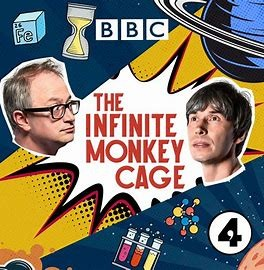The infinite monkey cage (podcast)
Subject: Physics
Type: Podcast
By: BBC Radio 4

How long is it?
There are 220 episodes. Episodes can be anywhere between 12 and 57 minutes in length.
Is it easy to understand?
Some episodes do discuss complex topics, but the podcast is for a popular audience.
Who is it for?
It is aimed at adults or teenagers who are interested in science and want to be entertained while they learn about it. Be aware that the podcast includes mature language.
How recent is it?
The Infinite Monkey Cage released its first episode in 2010 and continues to release episodes to this day.
Series 1
Science and Comedians
Extraterrestrial Life
Quantum Physics
Science and Religion
Series 2
Popular Science
Trust me, I’m a Scientist
Science Fiction, Science Fact
Things Can Only Get Better?
Series 3
Apocalypse
Modern World
Randomness
Philosophy
Series 4
What Don’t We know?
Six Degrees
So You Want To Be An Astronaut?
Is Cosmology Really a Science?
Is There Room for Mysticism in a Rational World?
Science vs The Supernatural
Series 5
What’s the North Ever Done for Us?
Balance
The Origins of Life
Sound
I’m a Chemist Get Me Out of Here
Christmas
Series 6
Oceans
Science Mavericks
Does Size Matter?
Symmetry
Parallel Universes
Science v Art
Series 7
Space Exploration
Improbable Science
Secret Science
Brain Science
Creating Life
Christmas Behaviour
Series 8
Death
Glastonbury
Space Tourism
What Makes Science a Science?
Alfred Russel Wallace
Science Museum
Series 9
Risk
Through the Doors of Perception
Science Rocks!
To Infinity and Beyond
Should We Pander to Pandas?
Science and Spin
Series 10
Numbers Numbers Everywhere
Are Humans Uniquely Unique?
Does Science Need War?
Can Science Save Us?
Before the Big Bang
Irrationality
Series 11
Deception
Fierce Creatures
Solar System
When Quantum Goes Woo
What is the Point of Plants?
Serendipity
Series 12
New York
Los Angeles
Chicago
San Francisco
Speed
Forensic Science
Series 13
Invisible Universe
Reality
Maths of Love and Sex
Climate Change
Series 14
The Sound of Music
The Recipe to Build a Universe
Sleep
Battle of the Sexes
200 Years of Frankenstein
The Universe
Series 15
The Science of Everyday Life
How to Beat the House and Win at Games
Science’s Epic Fails
Oceans
The Human Story
Making the Invisible Visible
Series 16
What Particles Remain to be Discovered?
Astronaut Special
Oxygen
Will insects inherit the earth?
Are We Living in a Simulation?
The Mind vs the Brain
Series 17
When Two Stars Collide
The Secret Life of Birds
Antibiotics
Teenage Brain
How Animals Behave
Volcanoes
Series 18
Big Data
Invasion
Immune System
The Human Voice
GCHQ
Series 19
Microbes
The Future of Humanity
Origin of Numbers
Are humans still evolving?
How to Build a Bionic Human
How We Measure the Universe
The Infinite Moonkey Cage
Series 20
Dinosaurs
Clever Cretures
Science of Dreaming
Anniversary of the Periodic Table
Brits in Space
Series 21
Science of Laughter
Conspiracy Theories
Cora Reefs
Fire
Quantum Worlds
UFO special
Lucy Beaumont’s Close Encounters
Series 22
The End of the Universe
Black Holes
Space Archeology
An Astronaut’s Guide to Isolation
The Sun
When the Monkeys Met the Chimps
The Human Brain
Life
Does Time Exist?
Series 23
Under Our Night Sky
Neanderthals
The Science of Cooking
The Fundamentals of Reality
A History of Rock
Series 24
Bats vs Flies
Exploring the Deep
The Wood Wide Web
Black Holes
Astronauts
Brains
How to Teach Maths
Series 25
What have we learnt from Covid?
Exploring our solar system
Hunting for Exoplanets
Can we cure ageing?
The Age of Conspiracy?
The Deep Space Network
Why does wine taste good?
Series 26
Southern Skies
Australia’s Scary Spiders
How to think like a mathematician
How to Commit the Perfect Murder
How Far Can the Human Body Go?
Magic Materials
Series 27
Are we what we eat?
Supervolcanoes
Bees v Wasps
The Magic of Mushrooms
The Secret Life of Sharks
Ancient DNA Secrets
Cosmic Dust
Series 28
Octopuses!
Coincidence
How I is AI?
The Scale of Life
Hollywood in Space
Jo Brand’s Quantum World
The Monkeys meet The Sky at Night
Series 29
Egyptian Mummies
Could it be magic?
Asteroids
Poison
Cats v Dogs
Higgs Boson
Series 30
The Wonder of Trees
Board Games
‘Beastly Bodies’ Kids Special
Extreme Exploration
What a Gas!
An Unexpected History of Science
Alien Life
The Infinite Monkey’s Guide to…
Series 1
The Supernatural
The Apocalypse
Space Travel
The Movies
Strawberries
Building a Universe
Oceans
Infinity
Audience
Series 2
Murder
Love
Gardening
Talking to Aliens
The Gods
Gambling
Failure
The Future
Tiny Things
My thoughts…
I listened to quite a few episodes of The Infinite Monkey Cage and these are my favourites, as well as my thoughts on the topics discussed:
- Randomness
- What Don’t We Know?
- What Makes Science a Science?
The importance of understanding probability
I think one of the most important scientific concepts to understand is probability because it is so easy to make mistakes with. Even mathematicians go wrong with probability. So, maybe we shouldn’t expect to become probability experts, but I think the complexity of probability is precisely why we must aim to grasp a basic understanding of it.
This is particularly important because we are exposed to probability figures on a daily basis, for example in the news, as so many people try to predict the future with mathematics. For instance, a newspaper said that when a women won the lottery twice in four months, there was a 1 in 17 trillion chance of it happening. However, this was the probability of this particular person buying the two winning tickets, not of anyone buying them. The probability of any person in America buying two winning lottery tickets in a four month period was actually 25%.
An understanding of probability can also be helpful at an arcade. For example, when playing a slot machine, if the probability of getting a jackpot is 1 in 10, people tend to assume that the probability of winning the next gamble increases if they’ve lost the last few gambles. However, this doesn’t work because each gamble is random; the probability is always 1 in 10, no matter what came before. This is called the gambler’s fallacy and it occurs because human brains are wired to spot patterns. This was an evolutionary advantage that helped us spot tigers in long grass, for example.
As well as this, I think that an understanding of probability can be helpful in understanding why we shouldn’t be scared of travelling by plane (although it’s bad for the environment) as it’s actually safer than travelling by car. For all of these reasons, I think probability is an incredibly important mathematical concept to get our heads round.
Will we ever know everything?
I don’t think we will ever know everything because that would mean the end of science. Science says that we should doubt what we think we know, which is why we have proven ourselves wrong about so many things since the field emerged. So, if we were to know everything, it would mean the end of all doubt, as well as the end of all curiosity. I would argue that scientific knowledge, without curiosity and questioning, becomes religion, at which point it is no longer science at all. So, as long as the scientific method is practiced, we won’t know everything for certain.
Even if we did every experiment hundreds of times and the results appeared unequivocal, there is still room for doubt because conducting the perfect experiment is incredibly difficult, particularly in fields such as medicine. Therefore, I think it is unlikely that we will ever know everything with absolute certainty and be completely sure that there is nothing left to learn.
What makes a science a science?
I think evidence is at the core of science. The difference between a science and a non-science is in the approach used and how much it values evidence; this matters far more than what is being studied.
However, it’s important to recognise that the reality of science may not always fit our definition of it. Not every study is as robust as it would ideally be, but often we call it science in order to demonstrate that the information it presents is more grounded than just any theory. So, some science is technically more scientific than other science, but the most important thing is that scientists point out the flaws in each other’s experiments and don’t forget to pay attention to the studies which don’t yield attention-grabbing results.
